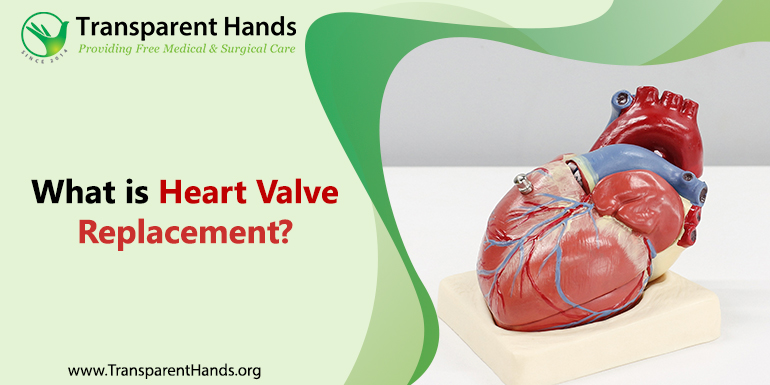What is heart valve replacement?

The human heart has four valves, one in each chamber, to ensure an adequate supply of blood to the body. When any of these valves malfunctions, the heart is not able to pump enough blood, which can lead to serious medical conditions. Such conditions are called valvular diseases, which are further divided on the basis of affected valves. Surgical intervention is the only permanent solution to valvular diseases and the procedure is known as heart valve replacement.
How Does the Heart Work?
In order to understand the conditions comprehensively, one must have basic knowledge of the heart’s anatomy and physiology. It helps in understanding the importance of valves and potential problems that can arise owing to their impairment.
Anatomy of the Heart
The human heart consists of four chambers known as ventricles and atriums. The upper two chambers are called atriums while the lower two are known as ventricles. The left and right sides of the heart are separated via a muscle membrane named Septum. Bicuspid and Tricuspid valves control the flow of blood between the left and right ventricles and atriums respectively.
Blood Pressure Medications to Lower the Risk of Heart Ailments!
Physiology of the Heart
The heart’s fundamental function is to receive deoxygenated blood and pump out oxygenated blood to the body. The deoxygenated blood is received via superior and inferior vena cava. While the oxygenated blood is pumped out via a large artery called the aorta. The heart itself cannot oxygenate the blood and hence sends the blood to the lungs via the pulmonary artery and receives oxygen-enriched blood via the pulmonary vein. A regulatory mechanism is available in the form of valves.
Bicuspid Valve
It regulates the blood between the left atrium and ventricle. It only opens when oxygenated blood is to be transported in the left ventricle.
Tricuspid Valve
The tricuspid valve is located between the right atrium and ventricle and opens only when deoxygenated blood is transferred into the right ventricles.
Aortic Valve
The aortic valve regulates the blood flow from the ventricles to the aorta, the artery that supplies blood to the entire body.
Pulmonary Valve
The pulmonary valve controls the blood flow from the right ventricles to the lungs.
Valvular Diseases
The position of each valve is strategic and impairment of these valves causes loss of control over blood flow. For example, if the pulmonary valve is impaired, it will either overload the lungs or hinder the transportation of blood to the lungs. Both conditions are serious and can impair blood supply to bodily organs, and consequently, damage them. It happens because of improper growth or damage to the structure of valves because of:
- Holes in valves
- Detached flaps
- Excess valve tissue
- Damage to structural support
- Fusion of valves
- Tightening of valves
As a result of these conditions, valves either become narrow (known as stenosis) or leak, which causes the backflow of blood known as regurgitation.
Symptoms of Valvular Diseases
Patients experiencing valvular may have these symptoms:
- Shortness of breath
- Chest pain
- Fatigue
- Fainting
- Fever
- Rapid weight gain
- Irregular heartbeat
Risk Factors
Although valvular diseases can affect individuals of all ages and genders, there are certain factors that put them at a higher risk. These include:
- Genetic Predisposition
- Cardiac Infection
- Deranged lipid profile
- Hyperthyroidism
- Hypertension
- Diabetes
- Heart Attack
Valve Replacement
Depending on the severity of the condition, surgeons either perform heart repair or replace the valve altogether. Repairing is carried out via Annuloplasty which involves tightening of the ring around the heart’s valve. Valvuloplasty is done via a catheter using an inflatable balloon to repair the heart valve with a narrowed opening.
However, when the damage to heart valves cannot be repaired via these procedures, surgeons replace the valves completely. The valve is selected by analyzing the patient’s condition, age, and allergies to different compounds. Two options are generally available: mechanical valves and biological valves.
Mechanical Valves
These are made of carbon and metal and mimic the natural valves of the human heart. Patients that receive these valves can hear clicking sounds, which some may find annoying at first but most individuals get used to it. Since these valves do not degrade over time, additional surgeries are not required. Hence, these are suitable for patients who are young.
Biological Valves
Biological valves are obtained from biological sources such as cows and pigs, as well as the cloning of human heart cells. These implants are prone to degradation and surgeons usually only use them when the patients are at an advanced age. Patients that have kidney-related problems may also be advised to get such implants.
Complications of Valve Replacement
Heart valve replacement is a major medical procedure and carries some risks. Medical science has made several breakthroughs to mitigate them but some are still prevalent. These include:
- Blood loss
- Cardiovascular events like stroke or heart attack
- Infection
- Arrhythmias
- Pneumonia
- Breathing problems
- Pancreatitis
What To Expect After Valve Replacement?
Patients that receive valve implants are at higher risk of blood clots which are mitigated by anti-clotting medications. Patients have to take these medications throughout their lives and monitor the clotting profile routinely. Patients are advised to get tested regularly because these medications also increase the risk of internal bleeding. By monitoring their clotting profiles, physicians and pharmacists adjust dosages of medication to prevent complications.
Bottom Line
Heart valve replacement is a life-saving surgery but the procedure can be quite expensive. Transparent Hands is a charitable organization that offers this procedure free of cost to patients that are economically marginalized. As a non-profit organization, we need the support of generous donors like you to help patients awaiting heart valve replacement. Donate now to this cause.
Cold & Flu: Prevent Seasonal Ailments










Leave a Reply